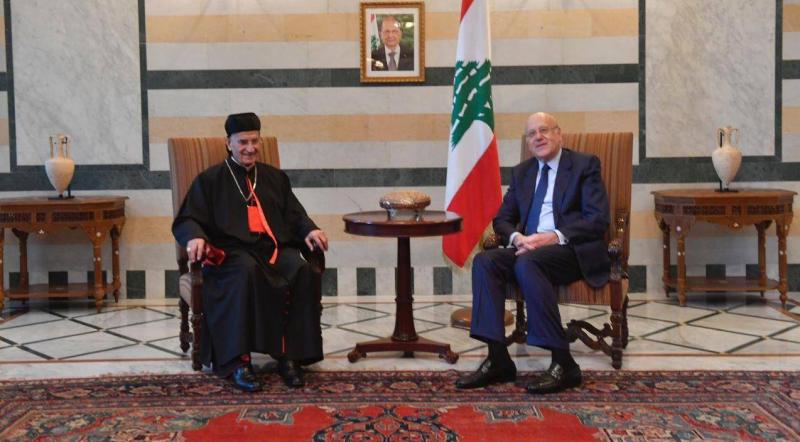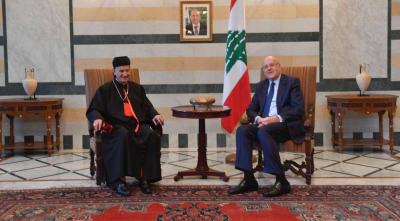As attention turns toward the ongoing war at the southern border, and internally to what will arise from Sheikh Saad's visit to Beirut, Bkerke has once again attracted attention due to the renewed and qualitative stances of its leader. There is an increasing internal desire to ensure that the Church is not "offended," as this could have negative repercussions on various files. It has become clear that the patriarchal edifice is unhappy with the general course of affairs, especially regarding the "Christian vacancy" in governance and administration. Most Maronite bishops share the belief that the minimum consensus achieved among Christians has succeeded only in preventing a president from reaching Baabda without "Christian cover," yet this has left many negative repercussions.
Sources close to the matter inform that the Maronite Patriarch is "uncomfortable" with the management of the current Prime Minister and the "Shiite duo" concerning domestic and foreign issues. He has conveyed multiple messages, both in his sermon on the occasion of the patron saint's feast and in Sunday’s sermon, which complemented the line that Bkerke has adopted since the "October 17 Revolution," defending the glory of Lebanon.
The sources continue that what is happening today does not serve the higher Christian interest in the long term. In the ongoing battle to elect a president for Baabda, no one can predict its outcome at this stage. Christians are losing key positions that formed the backbone of their existence in the state—from the presidential vacancy to the "vacuum" controlling the governorship of the Central Bank of Lebanon—despite a breakthrough in the battle for leading the army, which wouldn't have been possible without a wide base of internal and external support.
Regardless of what the Patriarch publicly states or "keeps hidden" regarding his positions and communications with the relevant leaderships, there is a perception that his sermons indicated that the atmosphere in Bkerke is "charged," and provided several indicators about the Patriarch’s alignment with current issues amid the existing internal and external turmoil.
The sources noted that Bkerke recognizes that the core issue lies with the Christian leaderships that are unable to unify their stances due to personal interests, preventing the ongoing hemorrhage. It remains fundamental for the concerned parties to act in a manner that affirms their commitment to partnership and to treat the open presidential election as primarily a Lebanese sovereign matter, a key to restoring rights with thanks to interested countries. However, the primary responsibility falls on the Lebanese Parliament and its political components to expedite the election of a reformist president that Lebanon needs at this juncture, alongside a government committed to reform and the return of rights and a parliamentary council dedicated to fulfilling its responsibilities.
The sources expressed concern over a clear plan that appears to be manifesting, aimed at undermining Christians within the state, especially after some rights were regained and the frustrations stemming from the early 1990s were eased, along with what befell the Christian leaderships at that time. They highlighted concerns about this scheme and its consequences, which could ultimately lead to a change in the identity and function of Lebanon, which Pope Saint John Paul II referred to as the "homeland of the message."
The sources revealed that recent events were not innocent, and form part of a picture still unfolding, of which hints can be gleaned from the words of the Maronite Patriarch. Despite the high stakes and the escalated rhetoric, Bkerke understands that the moment for electing a president is not right yet, even in light of the retaliatory Christian offensive, which would not change the reality given the changing scene in the region and on the southern front. For this reason, Bkerke may prefer the return of President Saad Hariri to the government under these circumstances, due to the relationship he had with the patriarch, which led him to visit the patriarch on several occasions, even to consult with him, unlike the current situation with President Mikati.
The sources confirmed that the Patriarch's statements are not intended to open a door toward the Sunni community, as some have tried to portray, creating an atmosphere of "Sunni resentment" toward Bkerke. Rather, the latter approaches matters from a national standpoint, not only from the perspective of Christian rights, as the current caretaker government has resumed decision-making arbitrarily, disregarding any national balances.
Finally, the sources concluded that Bkerke's stance, which has made it a "nourished mother of lions," is fundamentally about demanding what is related to basic human rights and dignity. Additionally, the Patriarchate is concerned with raising its voice so that the whole world hears, especially since the edifice is "the mother of the child" regarding Lebanon's establishment. Consequently, Bkerke certainly does not deny its relationships with the Vatican, Western countries, and its Arab friendships, which form a natural prop and moral support for its propositions.




